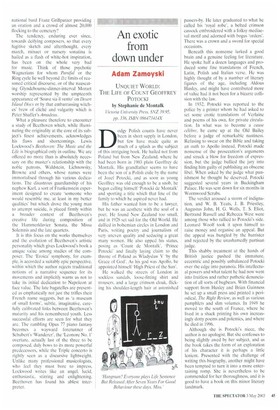An exotic from down under
Adam Zamoyski
UNQUIET WORLD: THE LIFE OF COUNT GEOFFREY POTOCKI by Stephanie de Montalk Victoria University Press. $NZ 39.95, pp. 336, ISBN 086473414X Dodgy Polish counts have never been in short supply in London, but few have made quite as much of a splash as the subject of this intriguing book. He hailed not from Poland but from New Zealand, where he had been born in 1903 plain Geoffrey de Montalk. His grandfather seems to have been the son of a Polish exile by the name of Jozel Potocki, and as soon as young Geoffrey was old enough to be a snob, he began calling himself 'Potocki de Montalk' and sporting a title which that line of the family to which he aspired never had.
His father wanted him to be a lawyer, but he was an aesthete with the soul of a poet. He found New Zealand too small, and in 1928 set sail for the Old World. He dallied in bohemian circles in London and Paris, writing poetry and journalism of very uneven quality and seducing a great many women. He also upped his status, posing as 'Count de Montalk', 'Prince Potockiand finally laying claim to the throne of Poland as Wladyslaw V 'by the Grace of God'. As his god was Apollo, he appointed himself 'High Priest of the Sun'.
He walked the streets of London in sockless sandals, loose-fitting shirt and trousers, and a large crimson cloak, flicking his shoulder-length hair at astonished passers-by. He later graduated to what he called his 'royal robe', a belted crimson cassock embroidered with a folksy mediaeval motif and adorned with bogus 'orders'. There was a crown and a sword for special occasions.
Beneath this nonsense lurked a good brain and a genuine feeling for literature. He spoke half a dozen languages and produced some fine translations of French, Latin, Polish and Italian verse. He was highly thought of by a number of literary figures of the age, including Aldous Hwdey, and might have contributed more of value had it not been for a bizarre collision with the law.
In 1932, Potocki was reported to the police by a printer whom he had asked to set some erotic translations of Verlaine and poems of his own, for private circulation. In what was to become a cause célèbre, he came up at the Old Bailey before a judge of remarkable nastiness. Refusing to swear on the Bible and taking an oath to Apollo instead, Potocki made nonsense of the prosecution's arguments and struck a blow for freedom of expression, but the judge bullied the jury into finding him guilty of publishing an obscene libel. When asked by the judge what punishment he thought he deserved. Potocki suggested several years in Buckingham Palace. He was sent down for six months in Wormwood Scrubs.
The verdict aroused a storm of indignation, and W. B. Yeats, J. B. Priestley, Augustus John, H. G. Wells, T. S. Eliot, Bertrand Russell and Rebecca West were among those who rallied to Potocki's side. Leonard Woolf took it upon himself to raise money and organise an appeal. But the appeal was bungled by the barrister and rejected by the unashamedly partisan judge.
This shabby treatment at the hands of British justice pushed the immature, eccentric and possibly unbalanced Potocki over the edge into paranoia. His intellectual powers and what talent he had now went into fruitless and rather pathetic denunciation of all sorts of bugbears. With financial support from Huxley and Brian Guinness he set up a small press and printed a periodical, The Right Review, as well as various pamphlets and slim volumes. In 1949 he moved to the south of France, where he lived in a shack printing his own increasingly dotty poems and polemics, and where he died in 1996.
Although she is Potocki's niece, the author is no apologist. But she confesses to being slightly awed by her subject, and as the book takes the form of an exploration of his character it is perhaps a little lenient, Presented with the challenge of writing this biography, another might have been tempted to turn it into a more entertaining romp. She is nevertheless to be commended for her thoroughness, and it is good to have a book on this minor literary landmark.










































































 Previous page
Previous page